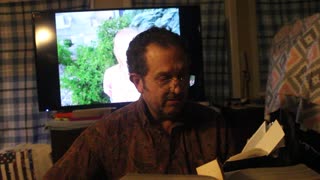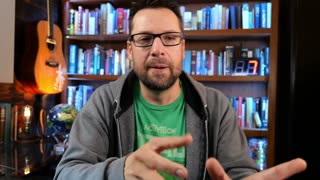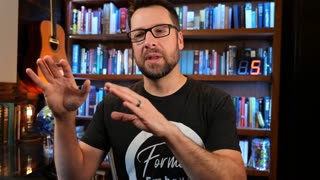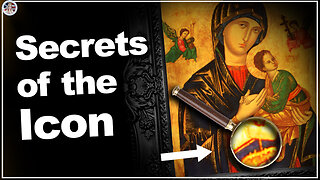Episode 2068: Marcel: The Remnant - Part 1
"The sacrament of Holy Orders will be ridiculed, oppressed and despised, for in this both the Church and God Himself are oppressed and reviled since He is represented by priests. The devil will try to persecute the ministers of the Lord in every way, and he will labor with cruel and subtle astuteness to deviate them from the spirit of their vocation, corrupting many of them. These corrupted priests, who will scandalize the Christian people, will incite the hatred of the bad Christians and the enemies of the Roman, Catholic and Apostolic Church to fall upon all priests. This apparent triumph of Satan will bring enormous sufferings upon the good pastors of the Church... Moreover, in these unhappy times, there will be unbridled luxury which, acting thus to snare the rest into sin, will conquer innumerable frivolous souls who will be lost. Innocence will almost no longer be found in children, nor modesty in women, and in this supreme moment of need of the Church, those who should speak will fall silent."
– Our Lady of Good Success 1594
Forward
In 2012, while collaborating with a French group interested in producing a film about Archbishop Marcel Lefebvre, I authored a script blending fiction and non-fiction (Faction) in the vein of Malachi Martin. However, the group opted for a documentary format over a feature film and dismissed my script due to its unconventional hybrid style and extensive length of 250 pages. I set the script aside for future consideration. Recent events, including Pope Francis' apostolic letter "Motu Proprio" Traditionis Custodes on July 16, 2021, prompted me to revisit the material and transform it into a book titled "Marcel: The Remnant," inspired by relevant scripture passages:
Isaiah 10:20-22: "And it shall come to pass in that day, that the remnant of Israel, and they that shall escape of the house of Jacob, shall lean no more upon him that striketh them: but they shall lean upon the Lord the Holy One of Israel, in truth. The remnant shall be converted, the remnant, I say, of Jacob, to the mighty God. For if thy people, O Israel, shall be as the sand of the sea, a remnant of them shall be converted, the consumption abridged shall overflow with justice."
Jeremiah 23:3: "And I will gather together the remnant of my flock out of all the lands into which I have cast them out: and I will make them return to their own fields, and they shall increase and be multiplied."
Romans 9:27-29: "And Isaias cried out concerning Israel: If the number of the children of Israel be as the sand of the sea, a remnant shall be saved. For he shall finish his word and cut it short in justice: because a short word shall the Lord make upon the earth. And as Isaias foretold: Unless the Lord of Sabaoth had left us a seed, we had been made as Sodom and we had been like unto Gomorrha."
Revelation 12:17: "And the dragon was angry against the woman: and went to make war with the rest of her seed, who keep the commandments of God, and have the testimony of Jesus Christ."
Introduction
“That Mass of St. Pius V like one sees at Ecône has become the symbol for the condemnation of the Council. I will in no wise accept the Council being condemned by a symbol. If an exception were made, the whole Council would be questioned, and consequently the Apostolic authority of the Council.” - Pope Paul VI
In the swirling currents of ecclesiastical discourse, there are moments when the weight of words transcends their mere utterance, becoming markers of profound shifts in theological landscapes. Such is the case with the poignant reflections of Pope Paul VI, encapsulated in the quote that opens this volume.
With uncompromising clarity, Paul VI delineates a fault line that cuts through the heart of Catholic tradition. A fault line marked by the juxtaposition of the venerable Mass of St. Pius V and the transformative ethos of the Second Vatican Council. Paul VI words, though uttered decades ago, reverberate with a prescience that pierces through the veil of time, inviting us to confront the fundamental questions that lie at the intersection of tradition and innovation.
In these pages, we embark on a journey of introspection and inquiry, guided by the incisive analysis of the author. Through meticulous examination, they unveil the implicit symbolism inherent in the juxtaposition of the Old Mass and the Council a symbolism that lays bare the tensions between continuity and change, preservation, and progress.
As we navigate the turbulent waters of theological discourse, the author beckons us to confront uncomfortable truths and interrogate cherished assumptions. What does it mean to safeguard the Mass of all time while embracing the spirit that seeks to dismantle it? Can we reconcile the irreconcilable, or are we fated to grapple with the paradoxes that define our faith?
Drawing upon the life of Archbishop Lefebvre, the author invites us to confront these questions with intellectual rigor and spiritual honesty. For in the crucible of inquiry lies the promise of deeper understanding and a renewed commitment to the timeless truths that anchor our faith.
In an age marked by division and uncertainty, this volume stands as a beacon of clarity a testament to the enduring power of dialogue and discernment in the pursuit of truth. May its pages inspire us to embark on our own journeys of discovery, guided by the light of tradition and the courage to confront the challenges of our time.
The Motu Proprio
The sun beat down upon St. Peter's Square as Pope Benedict XVI stood before a gathering of faithful, his voice resolute as he delivered his decree, the Motu Proprio, "Summorum Pontificum". The date, July 17, 2007, marked a pivotal moment in the history of the Catholic Church since Vatican II.
The Vatican reporter, stationed amidst the crowd, relayed the events to the world. Questions lingered in the air, swirling like the breeze that swept through the square.
"Why would the Pope issue such a decree?" the reporter inquired, seeking clarity from Fr. Swartz, a Roman Catholic priest.
Fr. Swartz, his expression grave, explained, "The move by the Pope has raised concerns about reviving parts of the old liturgy that Jews consider anti-Semitic, gays consider homophobic, women consider sexist, dwarves consider anti-dwarfic, and priests consider too difficult to learn."
The tension simmered as Fr. Swartz continued, shedding light on the discontent brewing among clergy and faithful alike. The publication of the Motu Proprio, accompanied by a letter from the Pope, left many questioning the motives behind the revival of the Latin Mass.
As Fr. Swartz spoke, Fr. Gabrielli and Fr. Jaeger, two priests from different generations, Fr. Gabrielli age 80 and Fr. Jaeger age 28, walked away from the square, engaging in a dialogue that hinted at deeper mysteries and long-standing traditions.
Fr. Jaeger asked Fr. Gabriele what he knew about a prelate named Archbishop Marcel Lefebvre whom everyone credits for the Pope’s turn back to the Traditional Mass. Fr. Gabriele asked if he had the time for the complete story and if so they should sit at a nearby café since it will take a while. Fr. Jaeger responded that he absolutely had time but insisted he would pay for the meal and drinks. Fr. Gabriele agreed and started by going back to the early life of Archbishop Lefebvre during the first world war when Marcel was still a child. Then Fr. Gabriele started the story as they walked to the café. He began explaining how Marcels father, Rene, needed to leave immediately in the war effort.
Chapter 1: The Departure of Rene Lefebvre
"How will we keep in touch, what should I do if I need to contact you?" Marcels mother Gabrielle Lefebvre's said as voice trembled with concern as she faced her husband, Rene Lefebvre Sr.
"I will have an intelligence officer relay messages between us," Rene assured her.
The servants started to bring the children into the living room, where they gathered around the statue of the Blessed Mother. Marcel rushed over to start lighting the candles, a task he took on with reverence.
"Marcel, tonight you will lead the Rosary," Rene instructed his son.
"I believe in God the Father almighty, creator of heaven and earth," Marcel began, his voice steady despite the weight of impending change.
Rene Sr. opened his door and called out to Franz Neumann, his trusted foreman, for a meeting. The hum of the loom machines filled the air as Franz made his way up the stairs to Rene's office, concern etched on his face.
"Franz, I need to speak to you about a transition plan," Rene stated as Franz entered the room.
"What transition? Are we closing the factory?" Franz's voice betrayed his worry.
"No, Franz, my transition. I will need to leave town indefinitely, and you are my most trusted foreman," Rene explained.
Gabrielle watched from a distance as Rene and Franz discussed the future of the factory. Her heart weighed heavily with the impending departure of her husband.
As Rene bid farewell to Franz and headed towards the front door, Gabrielle approached him with tears in her eyes.
"Rene, my prayers are with you. Please do all you can to stay safe and come back to us," Gabrielle pleaded.
"I will come back. I have the Blessed Mother watching over me and my family. Stay strong," Rene reassured her before stepping into the waiting car.
The war raged on, and the men of Tourcoing Nord answered the call to arms, leaving behind their families and livelihoods. Gabrielle stood among the women; her gaze steady as she offered comfort to those in need.
"Mrs. Lefebvre, what do all the mothers do for work as their husbands are called into service? What will they live on?" Mrs. Neumann's voice quivered with uncertainty.
Gabrielle paused, gathering her thoughts before responding with strength and compassion.
"Let the future happen. We will do what we can. The rest is in God's hands. Be strong if not for yourself, then for the other women and your family. They are watching," Gabrielle encouraged.
As Marcel burst into Rene Sr.'s office, the weight of the world seemed to press upon Gabrielle's shoulders. Yet, in the midst of uncertainty, she found solace in her faith and resolved to carry on in the face of adversity.
Chapter 2: Occupation and Defiance
In the quiet town of Tourcoing Nord, France, the rumblings of war had become an ever-present backdrop to daily life. Gabrielle Lefebvre, the owner of a bustling textile factory, navigated the streets with a sense of unease as fighting soldiers and their prisoners trudged through town. The arrival of German forces brought an abrupt change as helmets gleamed in the sunlight and lances loomed ominously overhead.
Gabrielle's concern deepened as German officers corralled the townspeople into the square, issuing orders with an air of authority. Stepping forward from her factory, she confronted a particularly imposing officer, her worry evident on her face. Her inquiry about the fate of her employees was met with a curt response, leaving her with more questions than answers.
As German control tightened its grip on Tourcoing Nord, Gabrielle's resolve to resist grew stronger. In a daring act of defiance, she concealed wool in the walls of her factory, determined to protect her livelihood and her workers from the German war machine. Tensions simmered as German patrols prowled the streets, searching for any signs of dissent.
When the inevitable discovery of the hidden wool led to Gabrielle's arrest, her courage only seemed to intensify. Even as she faced interrogation and imprisonment, her spirit remained unbroken. Meanwhile, Marcel, her son, grappled with the harsh realities of life under occupation, his determination to carry on his mother's fight fueling his every action.
As the war dragged on, the Lefebvre family found themselves caught in the maelstrom of conflict. With Gabrielle imprisoned, Marcel and his siblings faced a daily struggle for survival, their resilience tested at every turn. Despite the hardships, they clung to hope, drawing strength from their faith and their unwavering belief in justice.
In the face of adversity, Marcel emerged as a beacon of hope for his family and their community. His courage inspired others to resist the occupation, even as the specter of German reprisals loomed large. Through acts of kindness and defiance, he kept alive the flame of hope that one day, freedom would return to Tourcoing Nord.
As the tide of war turned and the Allies advanced, the people of Tourcoing Nord dared to dream of liberation. When the long-awaited day finally arrived, it brought with it a sense of jubilation and relief. For Gabrielle, released from her prison cell, it was a moment of bittersweet triumph as she reunited with her family, her spirit unbroken by the trials of war.
As Marcel looked to the future, he knew that the struggle was far from over. But with the war behind them, he could finally pursue his dream of becoming a priest, following in the footsteps of his mother's unwavering faith. Together, the Lefebvre family stood as a testament to the power of resilience, courage, and hope in the face of adversity.
Chapter 3: Choosing the Path: Embracing the Journey
Marcel Lefebvre sat opposite his father, Rene, in their modest home in Tourcoing Nord, France. The weight of his father's expectations hung heavy in the air as they discussed Marcel's future. Rene, a staunch traditionalist, urged Marcel to pursue a path he deemed more suitable a journey to Rome, to study at the prestigious Gregorian University and become a priest.
"I am not like Rene," Marcel protested, his voice tinged with uncertainty. "I am not as intellectual, and all the studies are in Latin. To go there? Take courses at the Gregorian University, pass difficult examinations? No, Father, I want to stay in the Diocese."
Rene, firm in his convictions, countered Marcel's objections with a warning about the perceived liberalism of the diocesan priesthood. "Marcel, this is probably the last time I will instruct you on what to do with your life," he declared. "I cannot approve of you to become a Diocesan priest. They are way too liberal and progressive."
Gabrielle, Marcel's mother, added her voice to the conversation, invoking divine providence and pointing to the wartime circumstances that had led Marcel's brother to the French seminary in Rome. "Marcel, you should listen to your father," she urged. "It was meant to be that you join your brother."
With a mixture of resignation and determination, Marcel finally relented. "Children, I guess I am off to Rome," he announced, attempting to lighten the mood with a touch of humor. "Arrivederci Tourcoing Nord!"
Marcel's journey to Rome marked the beginning of a new chapter in his life, one filled with challenges, revelations, and moments of profound learning. At the Collège Français in Rome, under the guidance of Fr. Henri Le Froch, Marcel delved into his studies with a sense of purpose.
Rene Sr.'s visit to Rome offered Marcel a chance to reflect on his progress and the significance of his chosen path. Walking to the seminary grounds with his father, Marcel spoke of his growing understanding of the importance of proper formation. "Fr. Le Froch and the professors teach us how we should view current events, expose errors to us," Marcel explained. "It is a wonderful formation."
Rene Sr., impressed by Marcel's commitment to his studies, shared insights into the role of tradition and the teachings of the Church in shaping the path of a priest. "Marcel, Pope Pius X became a Saint because without a doubt all who knew him knew his traditionalism was that of Christ," Rene Sr. emphasized. "His constant formation and teaching of priests was to make certain this world would not be able to fool them into believing that modernism or humanism was the way of the Catholic Church."
Marcel, deeply moved by his father's words, expressed his desire to uphold the truth and stand firm in his convictions. "Our Lord himself also proclaimed the truth," Marcel declared. "Father, I hope I can speak that type of truth always."
Chapter 4: Transformation: A Priest's Conviction
As Marcel's journey continued, he found himself increasingly drawn to the rich history and missionary work of the Spiritans. Inspired by their dedication to serving the marginalized and spreading the gospel, Marcel felt a calling to join their ranks.
"To gain that which is worth having, it will be necessary to lose everything else," Rene Sr. reminded Marcel, echoing the challenges inherent in following one's true calling. "How is your health? How are you eating? How are you sleeping?"
Marcel assured his father of his well-being, but beneath the surface, a sense of uncertainty lingered. "Marcel, don’t worry, sleep well and put much in God's hands," Rene Sr. advised, his concern evident in his eyes.
As Marcel continued to navigate the complexities of his journey, he grappled with the realities of military service and the unexpected twists of fate that awaited him. With each step, he drew closer to uncovering his true purpose and embracing the path that lay ahead.
The warm embrace of Rome enveloped Marcel Lefebvre as he stood before Cardinal Basilio Pompilj, awaiting ordination. The grandeur of St. John Lateran Cathedral echoed the solemnity of the occasion. Marcel's father, Rene Lefebvre Sr., and his brother Rene Jr. watched with pride as he took his vows, committing his life to the service of God.
As they exited the cathedral, a sense of familial joy permeated the air. Rene Sr. reflected on the significance of the moment, cherishing the sight of his two sons dedicating themselves to the priesthood. Yet, beneath his pride lay a solemn truth the erosion of faith in their beloved France.
"Father, what does this say about our beloved France if we cannot trust our own Government?" Marcel inquired; his voice tinged with concern.
Rene Sr. paused; his gaze fixed on the horizon. "Marcel, I am sure you and Rene were kidded to some extent about your Father being a Monarchist," he began, his tone measured.
"We never paid much attention," Rene Jr. chimed in.
"True," Marcel acknowledged.
Rene Sr. continued, "Well, the reason I was called a Monarchist is that I never trusted a Government that didn’t have at its head a King or Queen that was Catholic."
Marcel's brow furrowed in confusion. "But why, Father?"
"Because, my sons," Rene Sr. explained, "when you look at how all the countries ousted their Royalty, they did so under the disguise that Royalty could not be trusted. That is the furthest thing from the truth. Royalty made sure that the people always followed Christ the King. These parliaments, congresses, and phony libertarian forms of governments are nothing but Freemasons in waiting. They are Humanists at heart."
"But what do they gain from it, Father?" Rene Jr. asked, his curiosity piqued.
Rene Sr. sighed; his voice heavy with conviction. "For one gain, and it comes directly from the words of their leader, Albert Pike," he replied. "He said, '…the World will soon come to us for its Sovereigns and Pontiffs. We shall constitute the equilibrium of the Universe and be rulers over the Masters of the World.'"
Marcel's eyes widened in realization as his father's words sank in. "The Right Hand of God," he murmured, understanding the gravity of the situation.
Rene Sr. nodded solemnly. "Stand up against error, always," he urged, his voice resolute.
Meanwhile, in a quiet conversation between Fr. Walter Jaeger and Fr. Michael Gabrielli, the implications of Archbishop Lefebvre's stance against error were explored. Fr. Gabrielli illuminated the significance of this stance, citing it as a pivotal moment in Marcel's life. "It showed him the malice and wickedness of the enemies of the truth," he explained. "But Pope Pius XII restated the same thing his father told him many years earlier: 'Stand up against error.'"
Fr. Jaeger struggled to comprehend the weight of these words. "Much of this is hard for me to grasp," he admitted.
Marcel Lefebvre's unwavering commitment to truth and righteousness would shape not only his own destiny but also the course of history. As he embarked on his journey as a priest, the echoes of his father's teachings reverberated within him, guiding him towards a path illuminated by faith and conviction.
Chapter 5: The Missionary Call
Father Joseph Chapello glanced up from his work as Father Marcel Lefebvre entered the room, a look of concern etched on his face. "How is he doing with the missionary work?" Joseph inquired; his voice laced with genuine interest.
"Well, as you probably heard from me before, my brother Rene is overloaded with work and there are not enough missionaries," Marcel responded, his tone heavy with the weight of the situation.
Joseph nodded thoughtfully. "Yes, he has written to you about that before. Is he becoming more insistent that you join him?"
Marcel sighed, a conflicted expression crossing his features. "Well, I know why my Dad named him after himself. He has the same effect on me. Seems to know how to get me to do what he wants. But he is a good priest, and I know he would ask if it weren’t true."
"Have you asked the good Cardinal or at least our Pastor about being reassigned?" Joseph inquired, hoping to offer some guidance.
Marcel hesitated before responding, "Well, our Pastor said that when I arrived, he welcomed me with pleasure but didn’t really have a need for a second curate. Now that I have spent a year with you, Father, I can see he was right. You seem to do the work of two priests yourself."
Joseph chuckled softly. "Oh boy, laying it on thick now. You know I could not have done it without you. The good Pastor is a holy man but sometimes underestimates the needs of this parish. But Father, if you think you could do better in Gabon, you should ask to be transferred."
"Father, can I share a little secret with you?" Marcel asked, his voice lowering slightly.
"Of course," Joseph replied, leaning in attentively.
"In spite of my brother's insistence, the missions do not attract me. At first, I thought that was my calling, but now I see things differently, and I do not know why," Marcel confessed, his words tinged with uncertainty.
"Well, Father, we all think we know things when we come out of seminary, but it's only after real experience that we find ourselves," Joseph offered reassuringly.
"So true. No, I was not made to be a missionary in faraway places; this does not appeal to me. I prefer to be a pastor or a curate in a village and to know all the people as we are doing right now. I truly feel we are doing some decent work," Marcel admitted, a sense of relief evident in his voice.
"Fully agree, Father," Joseph affirmed, a warm smile spreading across his face.
"But, Father, here is the conundrum. It is not about me but the will of God, the will of my superiors. If my brother needs help, I feel terrible that I am thinking about myself. Have we not been trained that it is not our will but God’s that should be done?" Marcel pondered aloud, seeking clarity in the midst of his inner conflict.
"As much as I would like to disagree with you, Father, because it is great to have you here, you are correct. It is not about our will. If that were the case, we would never have become priests," Joseph admitted, his tone gentle yet firm.
Marcel nodded, absorbing Joseph's words thoughtfully. "Well, that’s good of you to say. Just got my appetite back; let us go eat," he suggested, attempting to shift the conversation to lighter topics.
Joseph smiled warmly, grateful for the opportunity to offer guidance to his fellow priest. "Let's," he agreed, rising from his seat to accompany Marcel to the dining area.
Chapter 6: The Cardinal's Decision: The Novitiate
Cardinal Lienart sat at his desk, a stack of papers spread out before him, his expression focused as he reviewed the contents of a letter from Father Lefebvre. The sound of his secretary entering the room drew his attention away from his task.
"Your Eminence, the Superior General from the Holy Ghost Fathers is on the phone for you. Can you take the call, or should I have him call you later?" the secretary inquired, her voice respectful yet expectant.
"No, I will take the call," Cardinal Lienart replied, his interest piqued by the unexpected interruption.
As he picked up the receiver, a voice greeted him from the other end. "Hello, Your Eminence. I hope I have not disturbed you. Is this an enjoyable time for you?" the voice asked politely.
"Always have time for the Holy Ghost," Cardinal Lienart responded with a chuckle, his tone warm and welcoming.
"Very good. I have received a request from one of your priests in your Lille Diocese by the name of Father Marcel Lefebvre," the Superior General began, getting straight to the point.
But before he could continue, Cardinal Lienart cut him off. "Please excuse my interruption, but there's no need to continue, Father. I received a letter myself, as you can imagine," he interjected, a knowing smile playing at the corners of his lips.
"I thought as much. It is only proper," the Superior General replied, his tone acknowledging the mutual understanding between them.
"Yes, and I think it makes good sense for him to join his brother, since I have heard so much about the needs you currently have," Cardinal Lienart remarked, his voice reflecting genuine concern for the mission.
"That is very generous of you, Your Eminence. We truly can use the help, and we are so fortunate to receive a priest like Father Lefebvre, especially with full formation," the Superior General remarked gratefully, his appreciation evident in his tone.
"You are welcome. I will send my approval shortly. Have a wonderful night," Cardinal Lienart replied warmly, conveying his well wishes before ending the call.
As he hung up the phone, a sense of satisfaction washed over Cardinal Lienart. "Giovani, can you come in for dictation?" he called out to his secretary, ready to attend to the next task on his agenda.
The Cardinals Secretary walked in with a dictation pad and took a seat, prepared to assist him with whatever he needed.
"This will be a letter for Father Marcel Lefebvre," Cardinal Lienart began, dictating his response with a sense of purpose. "Dear Father Lefebrve, in response to your request to leave the diocese to join the Holy Ghost Fathers, yes, surely. We are, of course, always sorry to see one of our priests leave, but if you truly think you will be useful to the missions, we cannot refuse your request."
He continued to dictate, expressing gratitude for Father Lefebvre's service in Marais-de-Lomme and offering his blessings for the journey ahead.
Chapter 7: The Journey Begins: The Novitiate
Father Walter Jaeger turned to Father Michael Gabrielli, a look of curiosity evident in his eyes. "Father, what did the Superior General mean by 'especially the formation'? Was Father Lefebvre’s seminary training that much better than the Holy Ghost Fathers?" he inquired, seeking clarification on the matter.
Father Michael Gabrielli nodded thoughtfully, considering how best to explain the situation. "The Holy Ghost Fathers were happy to receive a secular priest because they did not have to take care of his formation. Even though Father Lefebrve was a student of the Holy Ghost Fathers in the French Seminary, but it was for the Lille Diocese," he explained, shedding light on the nuances of the situation.
"So, onto the missionary?" Father Walter pressed, eager to delve deeper into the narrative.
"No, he first entered the novitiate. He was with two priests that were all former students at the French Seminary," Father Michael clarified, providing context for Father Lefebvre's journey.
Father Lefebvre entered the front door of the Orly Novitiate House, brushing the snow from his coat as he stepped inside. Spotting the Novitiate Secretary, he approached with a sense of purpose.
"Hello, I am Father Lefebrve. Is Father Faure in?" he inquired, his voice echoing through the entrance hall.
"Yes, and we have all been expecting you. I will let him know you have arrived. Father Laurent and Father Wolff would like to see you as soon as you are finished with Father Faure," the Novitiate Secretary replied, her tone welcoming.
As Father Lefebvre was led into Father Faure's office, he could not help but feel a sense of anticipation building within him. This was the beginning of a new chapter in his journey, and he was eager to embrace it fully.
"Father Lefebvre, it is great to have you here. I am Father Faure, the Master of the Novices, and I want to introduce you to Father Desmats, the confessor for the priests," Father Faure greeted him warmly, gesturing towards the other priest seated in the room.
"Pleasure to meet you, Father," Father Desmats added, offering a friendly smile.
"Thank you, Fathers, for receiving me," Father Lefebvre replied, returning their greetings with genuine gratitude.
Father Faure proceeded to outline the details of Father Lefebvre's novitiate, explaining the various aspects of his training and what would be expected of him during his time at the Orly Novitiate House.
Father Lefebvre listened attentively, absorbing every word as he prepared himself for the challenges and opportunities that lay ahead.
Chapter 8: A New Beginning
Father Lefebvre sat at a table in the novitiate confectionery, surrounded by his fellow priests, a sense of camaraderie filling the air. As they shared stories and caught up on each other's lives, Father Lefebvre could not help but feel a sense of belonging among his peers.
"What do I need to know?" he asked eagerly, eager to learn as much as possible about his new surroundings.
"Wait, Marcel, tell us about the Diocese of Lille," Father Wolff interjected, his curiosity piqued by the mention of Father Lefebvre's previous assignment.
"It was a wonderful experience. Do you remember Fr Chapello?" Father Lefebvre responded, launching into a recount of his time in Lille and the impact of his fellow priests on his life and ministry.
As the conversation flowed, Father Lefebvre found himself opening up to his companions, sharing his hopes and fears for the future.
"Well, if the General Superior allows, are you going to accept?" Father Laurent inquired; his gaze fixed on Father Lefebvre with genuine interest.
"True. If the General Superior agrees, I will go. Plus, Bishop Tardy said since I did my studies in Rome, I would be a professor at the Seminary," Father Lefebvre explained, weighing the options before him with careful consideration.
"Very good, and away you go!" Father Laurent exclaimed, a note of excitement in his voice as he encouraged Father Lefebvre to embrace the opportunities that lay ahead.
But even amidst the anticipation of a new beginning, Father Lefebvre could not shake the lingering doubts that plagued his mind.
"Marcel, we must never lose touch with each other," Father Wolff remarked, his words a gentle reminder of the bond that united them as brothers in the priesthood.
"We never will, if the good Lord allows and the Blessed Mother supports," Father Lefebvre replied, his voice filled with quiet resolve.
As they shared a final meal together before Father Lefebvre's departure, a sense of camaraderie and friendship filled the room, binding them together in a bond that transcended time and distance.
With a heart full of gratitude and a spirit renewed by the fellowship of his fellow priests, Father Lefebvre prepared to embark on the next chapter of his journey, trusting in the guidance of divine providence to lead him wherever he was called to go.
Chapter 9. The Challenges of War - Gabon, 1943
"Dear Brother, you are a sight for sore eyes!" René exclaimed; relief evident in his voice as he embraced Marcel.
"Brother, after the last three years, five years, I never thought I would see you again," Marcel replied, his voice filled with gratitude for their reunion.
"Have you seen or heard anything about the family? How is Father?" René inquired, eager for news from home.
"I saw him and the family briefly three years ago. All were well," Marcel replied, his heart heavy with memories of their last meeting.
"I am concerned because I know Father must be part of British Intelligence, and the way this war is going for Hitler, God only knows what Father could have going on right now," René remarked, his voice filled with worry.
"René, you know our Father; he will never stop as long as there is a cause to fight for. But I do pray for him constantly for the very same reason," Marcel replied, his voice tinged with concern.
"Well, you are coming back at a very precarious time," René remarked, his tone serious.
"Why? I thought the French and British troops had things under control," Marcel inquired, eager to understand the situation.
"Well, with General de Gaulle’s troops, you never know. The English are assisting, but it is all the Communists and convicts pouring in at the same time. We are suffering quite a bit," René explained, his words filled with frustration.
"I understand the French are fighting each other here as well," Marcel remarked, his voice reflecting the turmoil of the times.
"Yes, that's true. But what is even more concerning is the detention of Bishop Tardy," René revealed, his tone grave.
"De Gaulle is detaining the Bishop? For what reason?" Marcel inquired, shocked by the news.
"This is what is so embarrassing. The poor black people see us French acting in such a manner; it truly scandalizes our ministry," René lamented, his voice filled with sorrow.
"What can we do?" Marcel asked, a sense of urgency creeping into his tone.
"Well, we will have to negotiate the Bishop’s release pretty quickly. Are you ready to dive in, or do you need a few days to get your feet under you?" René inquired; his voice filled with determination.
"Please, brother! Like we will ever have enough time to be ready with this war changing everything on a daily basis. Let us go," Marcel declared, his heart filled with resolve to face whatever challenges lay ahead.
The two priests boarding the ship where Bishop Tardy is being held and negotiating with General de Gaulle for his release. Both the priests taking the Bishop by the arm and escorting him down the ship gangplank towards the Mission.
Chapter 10: Facing Adversity - Gabon, Bishop’s Quarters
The Bishop sat behind his desk; his demeanor cleaned up from his ordeal on the ship but still somewhat disheveled in his speech. Fr. Marcel Lefebrve and Fr. René Lefebvre were walked in by the Bishop's secretary as they took seats on the other side of the desk, their faces reflecting concern for their beloved mentor.
"Marcel, why the look of gloom on your face? Something I should know?" the Bishop inquired; his voice filled with empathy.
"No, no, Your Eminence. I just cannot believe our own countrymen can be so disrespectful to the Church. To you, Your Eminence!" Marcel exclaimed; his voice tinged with indignation.
"Marcel, if Christ’s own people can have him scourged and crucified, who am I? Remember the times that we are living through, Marcel," the Bishop reminded him, his words carrying the weight of wisdom.
"I understand, Your Eminence," Marcel replied quietly, his heart heavy with the burdens of the world.
"No, Marcel, I don’t think you do. Are you keeping up with what is going on around the world? This war is going to create an apostasy as never seen before. Our real war will start after this one ends," the Bishop cautioned, his voice filled with foreboding.
"I have heard and seen the atrocities in my travels. It is as if Satan himself is in command of this war," Marcel remarked, his voice trembling with emotion.
"So well said, Marcel. Have you heard the story of Fr. Maximilian Kolbe?" the Bishop inquired, his voice softening with reverence.
"The Franciscan Friar?" Marcel replied, a note of recognition in his voice.
"Yes. Did you know of his great devotion to the Blessed Mother?" the Bishop continued; his voice filled with admiration.
"I did, Your Eminence. I read his works as well. He was an Apostle of Consecration to Mary," Marcel replied, his heart filled with reverence for the saint.
"Yes. Did you ever hear about the vision he had when he was a child?" the Bishop asked, his voice softening with nostalgia.
"He said 'That night, I asked the Mother of God what was to become of me. Then she came to me holding two crowns, one white, the other red. She asked me if I was willing to accept either of these crowns. The white one meant that I should persevere in purity, and the red that I should become a martyr. I said that I would accept them both,'" Marcel recalled, his voice filled with awe.
"You know he gave his life in a concentration camp by asking them to take his life instead of another prisoner?" the Bishop revealed, his voice filled with sorrow.
"Yes," Marcel replied quietly, his heart heavy with the memory of the saint's sacrifice.
"And all I had to endure were a couple of weeks on a ship. Not much to be said about that. Did you ever hear about Fr. Jozef Cebula?" the Bishop inquired; his voice filled with sadness.
"No, I have not, Your Eminence," Marcel replied, his curiosity piqued by the mention of another martyr.
"He was a Polish Oblate who was killed in the Mauthausen Concentration Camp in 1941 as well. He was arrested simply because he was a priest. Much for the same reason I was detained," the Bishop revealed, his voice tinged with bitterness.
"The difference being that he was not on a boat but in a concentration camp where he had to pound rocks and carry these 60 lbs. rocks and climb 144 step staircases called the 'Death Stairs' while he was being beaten and insulted by his tormentors. Do you know how he died?" the Bishop continued, his voice breaking with emotion.
"Sheer exhaustion from the abuse, I would imagine, Your Eminence," Marcel replied, his heart heavy with sorrow for the suffering of his fellow priests.
"No! He was ordered to run with a rock on his back, towards the camp's barb wire fence. A guard fired with his submachine gun and declared Jozef 'was shot while trying to escape,'" the Bishop revealed, his voice trembling with anger.
"How terrible," René remarked, his voice filled with horror.
"They then didn’t even allow him a Catholic Mass and Burial. Instead, they took his body to a crematorium and burned it. That was three months before the death of Fr. Maximilian Kolbe. I could provide you hundreds of these types of attacks on the priests, sisters, and Church. So as for me? Well, I was treated like royalty in my captivity compared to these saints," the Bishop remarked, his voice filled with sorrow.
"Your Eminence, our Lord and his Mother have other plans for you. They needed you to remain to carry on," Marcel declared, his voice filled with conviction.
"I suppose so. Just keep a watchful eye, Marcel, because in your travels, you will see much, and the works of Satan are everywhere," the Bishop cautioned, his voice filled with wisdom.
-
 1:05:36
1:05:36
CatholicReboot
1 month agoEpisode 2070: Marcel: The Remnant - Part 2
201 -
 34:54
34:54
CatholicReboot
1 month ago $0.03 earnedEpisode 2093: Marcel: The Remnant - Part 3 of 3
113 -
 1:21:14
1:21:14
Handinhandwithgodtv
1 month ago10 Questions with Mike Winger (Episode 13)
8 -
 9:47
9:47
OzarkHunger
1 month agoEpisode 64cD7 (9 - 16)
11 -
 1:30:14
1:30:14
Handinhandwithgodtv
1 month ago10 Questions with Mike Winger (Episode 11)
17 -
 1:18:29
1:18:29
Handinhandwithgodtv
1 month ago10 Questions with Mike Winger (Episode 12)
16 -
 1:19:30
1:19:30
Handinhandwithgodtv
2 months ago10 Questions with Mike Winger (Episode 10)
46 -
 27:46
27:46
TeslaWirelessRadio
1 month agoAdventure Ahead 44/10/21 (ep12) One of the 28th
65 -
 3:20
3:20
WATCH THE BIBLE
1 month agoREVELATION CHAPTER 1 ANIMATED, NARRATED & SUBTITLED
42 -
 7:42
7:42
America Needs Fatima
19 days agoMiracle of Our Lady of Perpetual Help
47